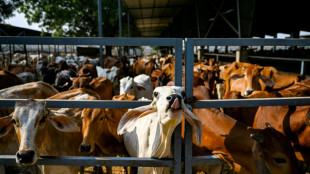
-
 Slot not surprised by flying start at Liverpool
Slot not surprised by flying start at Liverpool
-
Kagiyama leads Miura at NHK Trophy

-
 Partial UN probe of Gaza war dead over 6 months shows 'nearly 70%' women, children
Partial UN probe of Gaza war dead over 6 months shows 'nearly 70%' women, children
-
'Anti-government' samosa theft prompts India police probe

-
 Ayub hits 82 as Pakistan crush Australia in 2nd ODI
Ayub hits 82 as Pakistan crush Australia in 2nd ODI
-
Russian drones, missiles pummel cities across Ukraine

-
 China to raise local govt debt ceiling to boost struggling economy
China to raise local govt debt ceiling to boost struggling economy
-
Climate change poses multiple risks for banks

-
 Boxing club helps fight Greenland's suicide scourge
Boxing club helps fight Greenland's suicide scourge
-
Retired Olympian Daley dives into the spool with Tokyo knitwear show

-
 Japanese organ builder 'honoured' to restore voice of Notre Dame
Japanese organ builder 'honoured' to restore voice of Notre Dame
-
Sony quarterly net profit jumps but forecast unchanged

-
 Fur flies as Russia takes on young fans of 'quadrobics'
Fur flies as Russia takes on young fans of 'quadrobics'
-
Pharrell Williams to bring star power to Web Summit tech event

-
 On Kinshasa's streets hairdressers make a quick buck
On Kinshasa's streets hairdressers make a quick buck
-
Rauf takes five as Australia out for 163 in 2nd Pakistan ODI

-
 Harris thrusts himself into pole position in Australia 'bat-off'
Harris thrusts himself into pole position in Australia 'bat-off'
-
Trump makes first cabinet pick, eyes Putin talks

-
 Qantas plane returns to Australia airport due to 'engine failure', sparks fire
Qantas plane returns to Australia airport due to 'engine failure', sparks fire
-
Jackson leads thrilling Ravens comeback over Bengals

-
 Why young men turned out in droves for Donald Trump
Why young men turned out in droves for Donald Trump
-
China poised to approve more help for ailing economy

-
 Philippines cleans up after Typhoon Yinxing slams north coast
Philippines cleans up after Typhoon Yinxing slams north coast
-
Bucks snap losing streak with Jazz rout

-
 Quesada fears rustiness as Italy face Argentina in opening November Test
Quesada fears rustiness as Italy face Argentina in opening November Test
-
Hard graft takes 140kg 'big sponge' Tatafu to France debut

-
 Asian markets extend rally after Fed cut
Asian markets extend rally after Fed cut
-
'Constant threat' Dupont back for France against Japan

-
 Bestaven in pursuit of sailing's 'holy grail' in Vendee Globe
Bestaven in pursuit of sailing's 'holy grail' in Vendee Globe
-
French monument Saint-Etienne eye success again under new ownership

-
 Bayern look to extend lead as Kompany makes his mark
Bayern look to extend lead as Kompany makes his mark
-
Sinner ATP Finals favourite after brilliant and controversial year

-
 Cracked earth in Greece's saffron heartland as drought takes toll
Cracked earth in Greece's saffron heartland as drought takes toll
-
Sacred cow: coal-hungry India eyes bioenergy to cut carbon

-
 Cafe in Libya champions recycling and sustainability
Cafe in Libya champions recycling and sustainability
-
Man City seek to end mini-slump as Liverpool soar

-
 Facing Trump's return, EU confronts economic challenges
Facing Trump's return, EU confronts economic challenges
-
West Indies bowler Joseph suspended after storming off field

-
 Young African players chase football 'dream' in Brazil
Young African players chase football 'dream' in Brazil
-
Defeat to Trump prompts Democratic soul-searching

-
 Trump rides global wave of anti-incumbency
Trump rides global wave of anti-incumbency
-
First artwork by humanoid robot sells for $1.3m

-
 NBA Lakers assign Bronny James to G-League squad
NBA Lakers assign Bronny James to G-League squad
-
Dodgers pitcher Kershaw aims to be 'good as can be' after surgeries

-
 US Fed makes quarter point cut as Powell insists he would not quit
US Fed makes quarter point cut as Powell insists he would not quit
-
One Direction star took cocaine, alcohol, antidepressant before death

-
 F-15 fighters arrive in Middle East: US military
F-15 fighters arrive in Middle East: US military
-
Undocumented immigrants in US 'terrified' as Trump returns

-
 US Fed chair says will not leave early if asked by Trump
US Fed chair says will not leave early if asked by Trump
-
US town on alert after 43 monkeys escape research facility


Climate change poses multiple risks for banks
Climate change poses risks to banks on several levels: it can directly impact their finances, tarnish their image and land them in the courtroom.
Non-governmental organisations regularly criticise banks for the glacial speed at which they are moving to take climate change into account.
The latest was Reclaim Finance, which alongside several other NGOs took aim at European banks just days ahead of the COP 29 UN climate summit that begins on November 11 in Azerbaijan's capital Baku.
- Financial risk -
By continuing to finance fossil fuel projects, even as part of a transition to a green economy, banks are continuing to link their fates with the industry.
In an October 2022 report, Finance Watch calculated that the world's 60 largest banks held approximately $1.35 trillion in fossil fuel assets on their books.
There has been no major change since, according to the NGO's chief economist, Thierry Philipponnat.
The problem is that "there is no scenario where in 50 years fossil fuels will have any value," he told AFP.
Nations agreed at the COP28 climate summit in Dubai last year to transition away from fossil fuels.
And the International Energy Agency expects demand for oil, gas and coal to peak by 2030.
Economics professor Laurence Scialom at Paris-Nanterre University warned that "overnight entire asset classes will deteriorate."
Banks that hold shares and bonds of fossil fuel companies in their portfolios will see the value of those diminish, while fossil fuel companies could become credit risks as the sector's profitability is squeezed, she warned.
The fossil fuel industry represents a "financial time bomb" for banks and they still underestimate the danger, said Scialom.
Home mortgages are also at risk.
US consultancy Bain & Company last year warned that wildfires, drought and other climate risks threatened between 10 and 15 percent of the value of the real estate portfolios held by the world's top 50 banks.
- Reputation risk -
The research done by NGOs like Finance Watch and Reclaim Finance evaluating bank lending in light of climate change is regularly used by media and has begun to tarnish their public image.
Other groups have opted for more direct action such as disrupting shareholder meetings or demonstrating in front of headquarters buildings to draw attention to the behaviour of lenders.
These "name and shame" campaigns can be a powerful weapon for pressure groups as banks depend heavily on the confidence of clients.
- Legal risks -
NGOs have already challenged fossil fuel firms in court, with the most remarkable success to date being the 2021 victory by the Dutch chapter of Friends of the Earth against Shell.
Judges at The Hague District Court ruled three years ago that Shell must reduce its carbon emissions by 45 percent by 2030, as it was contributing to the "dire" effects of climate change.
That ruling was seen as an historic victory for climate change campaigners as it was the first time a company had been made to align its policy with the 2015 Paris climate change accords. Shell is appealing the ruling.
Activists are now turning to banks.
The Dutch chapter of Friends of the Earth launched in January of this year a case against the Netherlands' top bank, ING, for financing highly polluting companies.
Then in February Friends of the Earth, Oxfam France and another NGO filed suit against BNP Paribas accusing it of contributing to climate change via its financing of fossil fuel firms.
Valerie Demeure, who heads up research on ESG issues at Ofi Invest Asset Management, said the cases are "certainly the start in a series".
French law offers environmental activists a means to challenge companies.
Since 2017, large French firms are required to take effective measures throughout their supply chains to respect human rights and minimise environmental harm.
M.Gameiro--PC
